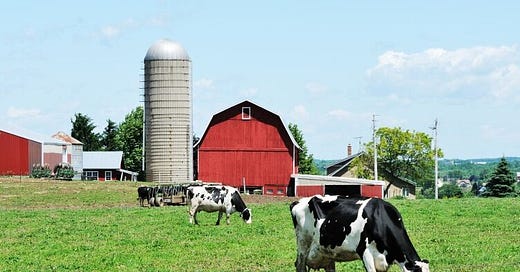Carney caves to Trump on digital tax; is supply management next?
For Donald Trump, gaining access to the Canadian dairy market is not about economic necessity—it’s about principle. It’s about cracking a closed, protected system that offends his transactional world
Most politicians—and Canadians—don’t fully understand how supply management works. But they do know this: it’s politically toxic to criticize. The dairy lobby has a long history of ending political careers, with Maxime Bernier being the most visible casualty. As a result, few dare to question the system, even as its flaws become harder to ignore.
That’s what makes Bill C-202 such a costly miscalculation. Enshrining protection for supply management in federal legislation—effectively removing it from the negotiating table in future trade talks—may go down as one of Parliament’s most economically short-sighted decisions in recent memory.
Rather than strengthening our agri-food sector, the bill ties the hands of Canada’s trade negotiators and signals to global partners that we are inflexible and inward-looking—at a time when diversifying trade relationships should be a national priority.
But beyond the diplomatic damage, Bill C-202 represents a missed opportunity to modernize and reform supply-managed sectors, especially dairy. Unlike poultry and eggs—which are vertically integrated, efficient, and could likely compete in a liberalized market—Canada’s dairy sector remains one of the least competitive and least transparent in the country.
Mandated milk dumping to maintain artificially high industrial prices. A chronic inability to scale up baby formula production—so much so that a Chinese firm, Royal Canada Milk, is building a plant in Kingston to meet domestic demand we ourselves can't address. The use of palm oil derivatives in cattle feed that affects butter quality. These are not isolated problems. They are symptoms of a sector more focused on protecting legacy systems than serving Canadians.
Supply management was built on Keynesian ideas of economic fairness, but it has calcified into a system that prioritizes farm gate stability over affordability, innovation, or market openness. It is no surprise that Canadian consumers pay some of the highest prices for dairy products in the world.
Which brings us to Donald Trump. For him, gaining access to the Canadian dairy market is not about economic necessity—it’s about principle. It’s about cracking a closed, protected system that offends his transactional worldview. Fresh off forcing Canada to abandon its digital services tax, Trump may now see himself as the liberator of Canadians from an outdated system that serves a small, powerful minority.
And he has the leverage to do it. If history is any guide, Trump won’t go after dairy directly. He’ll target what Canada truly values: access to critical minerals, clean energy exports, and water. He’ll weaponize dairy to extract concessions elsewhere. In doing so, he’ll transform a niche issue—one that represents less than 1% of Canada’s GDP—into a broader vulnerability that could cost us much more.
This is the fatal flaw of Bill C-202. In trying to shield supply management, Parliament has made it a bigger target. It’s not hyperbole to say we are one Truth Social post away from seeing our dairy sector dragged into another bilateral crisis.
And if that happens, the blame won't fall on Trump. It will rest with an industry that spent decades resisting reform—and with politicians who enabled it.
In a strange twist of irony, the only person with the power—and political will—to push Canada toward a more open, competitive dairy market isn’t Canadian. It’s Donald Trump.
And that, economically speaking, is as simple—and as uncomfortable—as it gets.




An excellent summary exposing the worst of Canadian politics, economics, trade relations, agriculture, and producer/consumer restrictions - all entangled in a dairy scheme that smacks the lips of a few MPs and a few farmers. We all need to cry over this spilled milk scandal. Only a failing country with myopic strategists would pull stunts like enshrining corruption in law like this, against its own best interests and the tastes of all its citizens and trading partners.
It ticks me off no limit when I read this kind of post…caves? Were you there during negotiations..did you deal with the US Moron? Could you at least concede there may well have been a good reason to as you say Cave? No sooner have we done picking and denigrating Trudeau..let us start on Carney..some of you may well think I know not of what I speak..all I know is we have a good man in Carney unless you could do better kindly keep quiet..